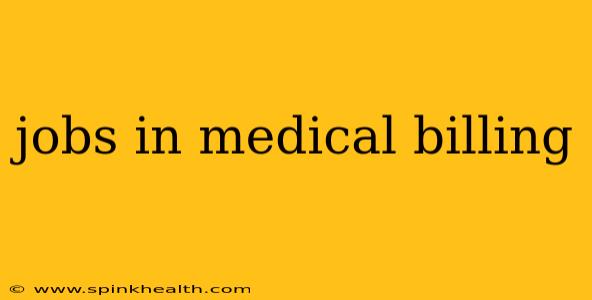The crisp white coat, the hushed tones of a hospital hallway, the dedication to patient care – these are images often associated with the medical field. But behind the scenes, ensuring the smooth operation of healthcare facilities and the financial well-being of medical practices is a crucial, often unsung, role: medical billing. This isn't just about numbers; it's about the intricate dance between healthcare providers, insurance companies, and patients, a dance that requires skill, precision, and a deep understanding of the healthcare system. This article delves into the fascinating world of medical billing jobs, exploring various career paths and answering your burning questions.
What are the Different Types of Medical Billing Jobs?
The world of medical billing offers a surprisingly diverse range of career paths. You might find yourself working directly for a healthcare provider, a billing service company, or even within a larger insurance organization. Let's explore some key roles:
-
Medical Biller: This is the entry-level position, often focusing on processing claims, verifying insurance information, and following up on denied claims. It’s a great starting point to learn the ropes of the industry and build a foundation for advancement.
-
Medical Coder: These professionals translate medical diagnoses, procedures, and services into standardized codes (like ICD-10 and CPT codes) used by insurance companies for processing claims. Strong attention to detail and a solid understanding of medical terminology are essential.
-
Medical Billing Specialist: A more senior role, involving the complete billing cycle, from charge capture to payment posting and collections. They often mentor junior staff and oversee the efficiency of billing processes.
-
Medical Billing Manager: This role involves overseeing a team of billers and coders, managing workflow, ensuring compliance with regulations, and optimizing billing processes for efficiency and revenue generation.
-
Revenue Cycle Manager: This is a high-level position responsible for the entire revenue cycle of a healthcare practice or facility, encompassing billing, coding, collections, and patient accounts. They work closely with leadership to develop and implement strategies for improving financial performance.
What are the Job Duties of a Medical Biller?
A medical biller's day is a dynamic blend of administrative tasks and problem-solving. Their responsibilities often include:
-
Entering patient data accurately into billing systems. This is a crucial step, as errors here can lead to claim denials.
-
Verifying patient insurance coverage. Understanding insurance plans, deductibles, and co-pays is essential for accurate billing.
-
Preparing and submitting insurance claims. This often involves using specialized software and electronic health record (EHR) systems.
-
Following up on denied claims. This requires strong communication skills and the ability to navigate complex insurance regulations.
-
Posting payments and managing patient accounts. This involves meticulous record-keeping and attention to detail.
-
Responding to patient inquiries. Excellent communication skills are needed to address patient concerns and provide clear explanations regarding their bills.
What Skills are Needed for Medical Billing Jobs?
Beyond technical skills, several soft skills significantly impact success in medical billing:
-
Attention to Detail: Accuracy is paramount. A single error can delay payments or lead to claim denials.
-
Strong Organizational Skills: Managing numerous patient files and insurance claims requires excellent organizational abilities.
-
Communication Skills: Interacting with patients, physicians, insurance companies, and other healthcare professionals requires clear, concise communication.
-
Problem-Solving Skills: Navigating claim denials and resolving billing issues requires analytical and problem-solving skills.
-
Computer Proficiency: Medical billing software and EHR systems are essential tools, requiring proficiency in various computer programs.
-
Knowledge of Medical Terminology: Understanding medical terminology is crucial for accurate coding and billing.
What Education and Training is Required for Medical Billing?
While a formal degree isn't always mandatory, many medical billing professionals have an associate's degree in medical billing and coding or a related field. Certifications such as the Certified Professional Coder (CPC) or Certified Billing and Coding Specialist (CBCS) can significantly boost career prospects and demonstrate professional competence. On-the-job training is also common, providing hands-on experience with specific software and billing processes.
What is the Job Outlook for Medical Billing?
The job outlook for medical billing and coding specialists remains positive, driven by the aging population and the continued growth of the healthcare industry. The demand for skilled professionals who can navigate the complexities of insurance claims processing and revenue cycle management is expected to remain strong for the foreseeable future.
How Much Do Medical Billing Jobs Pay?
Salary expectations vary depending on experience, location, and employer. Entry-level positions typically offer lower salaries, while experienced specialists and managers can command significantly higher compensation. Researching salary data for your specific location is recommended to get a realistic understanding of earning potential.
This journey into the world of medical billing jobs reveals a field brimming with opportunities for those with a dedication to accuracy, a passion for problem-solving, and a desire to contribute to the smooth functioning of the healthcare system. It's a career path that combines administrative prowess with the crucial support of patient care, offering a rewarding experience for those ready to embark on this rewarding and essential journey.

